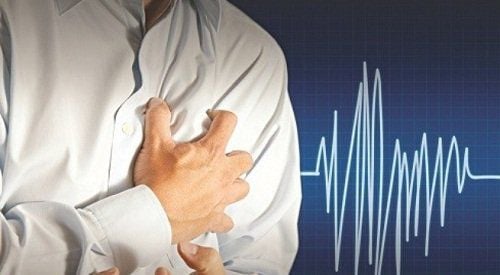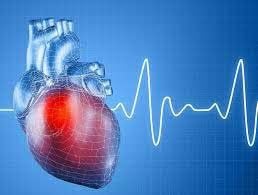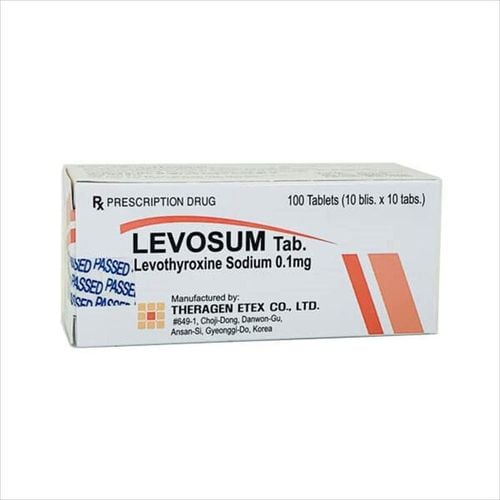This is an automatically translated article.
The article is professionally consulted by Master, Doctor Vu Thi Duyen - Department of Examination & Internal Medicine - Vinmec Hai Phong International General Hospital.
Hyperthyroidism is a condition in which the thyroid gland has an increased ability to synthesize and release the thyroid hormones T3 and T4 above normal levels. In which, Graves' disease is the most typical and most common form of thyroid disease.
1. Clinical symptoms of hyperthyroidism
Because the thyroid gland synthesizes and releases too much hormone, it affects many organs in the body. The most common are: Nervous system, cardiovascular system, thyroid gland, eyes, skin, muscles, metabolic disorders, body temperature regulation and some other endocrine glands.1.1. Disorders of metabolism and body temperature regulation Manifested by drinking a lot but thirsting quickly, eating a lot but being hungry quickly and losing a lot of weight due to increased metabolism. Always feel hot, sweat a lot, may have a low fever, making the sick person very afraid of heat. Warm, often moist, succulent palms – characteristic of Graves' disease hands. Digestive disorders: Increased intestinal motility, diarrhea or decreased secretions in the digestive tract Disturbance of protein and fat metabolism in the liver. Genitourinary disorders: Decreased libido, menstrual disorders, amenorrhea. 1.2. Cardiovascular disorders Hyperactive heart with palpitations, frequent tachycardia. The circuit is strong and tight. The upper blood pressure is elevated while the lower blood pressure is normal or decreased. If the disease is long and prolonged, there may be symptoms of heart failure such as fatigue, shortness of breath at night or during exertion, edema of the limbs. Sometimes arrhythmias lead to atrial fibrillation. It can eventually lead to angina attacks either on exertion or at rest, caused by increased myocardial oxygen demand when the heart is overworked. The blood vessels supplying the heart are mostly normal, not narrow.

Người bệnh cường giáp có thể gặp triệu chứng tim tăng động với biểu hiện hồi hộp đánh trống ngực
1.5. Ocular manifestations The protrusion may be bilateral, symmetrical or non-symmetrical. A feeling of glare, like dust in the eye, or pain in the eye socket or tearing. May be accompanied by edema of the eyelids, conjunctiva, cornea, corneal redness, pain when squinting or sometimes double vision. 1.6. Dysfunction of some endocrine glands such as adrenal, gonads or thymus.
2. Hyperthyroidism test
Quantification of thyroid hormone in the blood: Increase T4, T3 (or FT4, FT3), decrease TSH. Measure the concentration of radioactive iodine in the thyroid gland: The level of iodine absorption at different times increased compared to normal people. Quantifying the concentration of autoantibodies circulating in the blood: such as Anti TG, Anti TPO but most importantly TRAb, in Graves' patients, TRAb is positive in 80-90% of cases; Some of the conversion tests are not specific: Lower cholesterol and increase blood sugar or calcium. Complete blood count with agranulocytosis. Thyroid ultrasound showed diffuse enlarged thyroid nodules.3. Diagnosis of basedow's disease (a typical disease commonly seen in hyperthyroidism)
Clinically with hyperthyroid syndromeDiffuse (or mixed) thyroid goiter. Frequent fast heart rate. Exophthalmisis. Fatigue, heat, sweating, eating a lot, drinking a lot, losing weight; Mood swings, irritability, sleep disturbances, periodic muscle weakness or paralysis, tremors in hands and feet; Increase hormone levels T3, T4, decrease TSH; Increased concentration of 131I in the thyroid gland. TRAb positive or increased blood levels.

Nhịp tim nhanh thường xuyên là một trong những dấu hiệu chẩn đoán bệnh cường giáp
4. Direction of treatment of hyperthyroidism
The immediate goal is to return the patient to a euthyroid state and maintain this euthyroid state for a period of time, and to prevent and treat complications if any. There are three basic treatment methods available today: medical, thyroid surgery or radiation therapy.4.1. What drugs do hyperthyroidism take? Synthetic antithyroid drugs: Includes 2 groups:
Thiouracil subgroup (benzylthiouracil - BTU 25 mg; methylthiouracil - MTU 50mg, 100mg; propylthiouracil - PTU 50mg, 100mg); Imidazole subclass: Methimazole, carbimazole. All are 5mg. Dosage and administration:
Phase of attack: Average 6 - 8 weeks. Methimazole: 20 - 30mg/day, divided into 2 times; PTU: 400 - 450 mg/day divided into 3 times. Maintenance treatment period: Average 18 - 24 months. At this stage, the dose of the drug is gradually reduced every 1-2 months based on the improvement of symptoms; Methimazole each time reduce 5-10mg; maintenance dose 5-10mg/day; PTU is reduced by 50 - 100 mg each time; Maintenance dose is 50-100mg/day. How long does hyperthyroidism take to treat? If euthyroid status is maintained continuously during antithyroid drug therapy, it can be completely stopped after 18 to 24 months.
Iodine and iodine-containing preparations Dosage: Starting dose 5mg/day, optimal dose 50-100mg/day
Usage: Divide into 2-3 times, mix with milk, water, drink at main meals
4.2. Thyroid surgery Some cases will be indicated surgery: When medical treatment fails and often recurs, goiter is too large, pregnant women (3-4 months) and during lactation or no medical treatment conditions.
The goal of treatment will be to remove nearly the entire thyroid gland leaving 2 - 3g in each lobe to avoid resection of the parathyroid gland.
4.3. Treatment with radioisotope 131I If medical treatment (oral medication) for a long period of time does not work, patients > 40 years old have a tumor that is not very large, recurs after surgery or other cases. In severe heart failure that cannot be treated with long-term synthetic antithyroid drugs, radioactive iodine therapy may be considered.
However, some subjects cannot be treated with this method such as: pregnant women, lactating women or low white blood cells often.
131I dose is about 80–120μCi/gram thyroid (calculated on ultrasound or thyroid scan).
5. Where is the prestigious place to examine and treat hyperthyroidism?

Chuyên khoa Nội tiết - Tiểu đường thuộc Khoa Nội tổng hợp - Bệnh viện Đa khoa Quốc tế Vinmec Times City là một địa chỉ đáng tin cậy để thăm khám bệnh cường giáp
Specializes in applying new techniques in disease treatment: treating benign thyroid nodules with high-frequency ablation (avoiding thyroid surgery for patients). Especially, there is a team of well-trained and experienced medical doctors:
Associate Professor, Doctor, Doctor Nguyen Thi Hoan Associate Professor, Doctorate, Doctor Chu Hoang Van Master, Doctor Pham Thi Thu Huong Master, Doctor Bui Minh Duc Doctor Nguyen Ngoc Son Doctor, Doctor Pham Thi Hong Hoa Master, Doctor Nguyen Thi Cam Tu For detailed advice on diagnosis and treatment of hyperthyroidism located at Vinmec Times City, please contact HOTLINE 0243 9743 556 or register online HERE.














